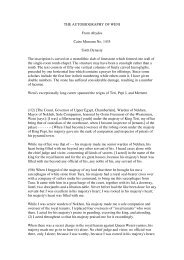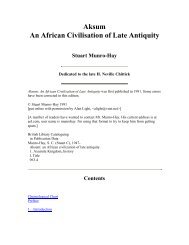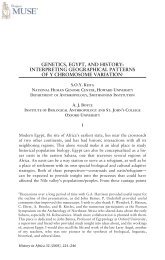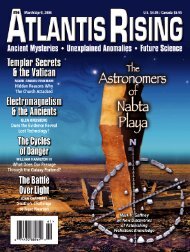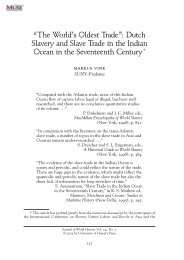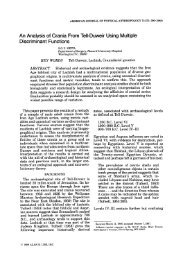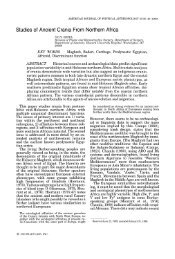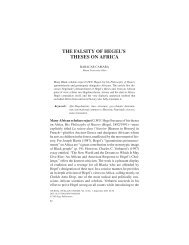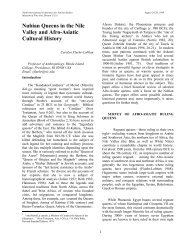The Negro trail blazers of California [microform] : a ... - Homestead
The Negro trail blazers of California [microform] : a ... - Homestead
The Negro trail blazers of California [microform] : a ... - Homestead
Create successful ePaper yourself
Turn your PDF publications into a flip-book with our unique Google optimized e-Paper software.
OF CALIFORNIA 2:3<br />
is given an interesting account <strong>of</strong> the part Estevanico, the <strong>Negro</strong>, took in the discovery<br />
<strong>of</strong> the Southwestern part <strong>of</strong> this continent, which eventually led to the discovery <strong>of</strong> <strong>California</strong>,<br />
as the following will show:<br />
"Soon after these threq Spaniards and the <strong>Negro</strong> reached Mexico City and told <strong>of</strong><br />
their strange experiences and the many cities they had passed through during the nine<br />
years <strong>of</strong> travel across the continent, Cortez. who had been deposed as Viceroy <strong>of</strong> Nueva<br />
Espana, but at the same time was given permission by the King <strong>of</strong> Spain to explore and<br />
discover at his own expense, whereupon after hearing <strong>of</strong> the arrival in Mexico City <strong>of</strong> these<br />
three Spaniards and the <strong>Negro</strong> and their experiences in exploring, decided to use the power<br />
given to him by the King to explore. He then proceeded to build some ships to be used<br />
bv him in an expedition <strong>of</strong> discovery, and started out. He sailed into the Gulf <strong>of</strong> Lower<br />
<strong>California</strong> and hence into the Pacific Ocean, where he discovered the Santa Cruz Islands,<br />
which he named "<strong>California</strong>."<br />
In the meantime Cabeza de Vaca and his party decided to return to Spain. <strong>The</strong>y<br />
embarked in separate boats; Cabeza de Vaca and Castillo in one boat, and Dorantes and<br />
the <strong>Negro</strong> in another. A terrible storm drove them back to port. Soon afterward they<br />
again set sail, when a more severe storm again overtook them, and Dorantes and the <strong>Negro</strong><br />
returned to shore. <strong>The</strong>y did not attempt again to leave. Since there was no "Wireless"<br />
in those days, Cabeza de Vaca did not know that the boat with Dorantes and the <strong>Negro</strong><br />
was not following him until he reached Habana, Cuba. After waiting for the boat a reasonable<br />
time he sailed for Spain. "Upon his arrival, he was made Governor <strong>of</strong> a province as<br />
a reward for his nine years <strong>of</strong> hardship while exploring in the interest <strong>of</strong> the Crown <strong>of</strong><br />
Castile. '<br />
Viceroy Mendoza, the then ruler <strong>of</strong> Nueva Espana, being anxious to explore in the<br />
interest <strong>of</strong> the King <strong>of</strong> Spain, hearing that the <strong>Negro</strong> and Dorantes were still in Mexico<br />
City, sent for Dorantes and told him he would fit out the necessary outfit for an expedition<br />
<strong>of</strong> exploring. Dorantes consented, but afterward decided not to undertake the task. He<br />
had not forgotten the nine years <strong>of</strong> exploration with Cabeza de Vaca.<br />
Viceroy Mendoza was not discouraged and determined to send out a party and to<br />
that end employed the <strong>Negro</strong>. His success at this is told in a letter to the King <strong>of</strong> Spain.<br />
It has been translated by Fanny Bandelier and says: "A letter written by the most<br />
Honorable Lord Don Antonio de Mendoza, Viceroy <strong>of</strong> Nueva Espana, to discover the end<br />
<strong>of</strong> the Firmeland <strong>of</strong> Nuena Espana toward the north. <strong>The</strong> arrival <strong>of</strong> Vasquez de Coronado<br />
with Friar Marco at Saint Michael <strong>of</strong> Culiacan with commissions to the governors<br />
<strong>of</strong> those parts to pacify the Indians, and not make slaves <strong>of</strong> them any more." Mendoza<br />
then tells at great length <strong>of</strong> fitting up an expedition for Dorantes which was given up<br />
'<br />
' and he still had in hand the <strong>Negro</strong> who returned from the aforesaid voyage who, together<br />
with certain Indians born in these parts, whom I sent with Friar Marco de Mica and his<br />
companions, a Franciscan Friar because they had long traveled and exercised in these<br />
parts and had great experience with the Indians and were men <strong>of</strong> good affairs and consciences—for<br />
whom I obtained leave <strong>of</strong> their Superiors. So they went with Friar Vasquez<br />
de Coronado, Governor <strong>of</strong> Nueva Galicia, unto the city <strong>of</strong> Saint Michael <strong>of</strong> Culiacan."<br />
Mendoza, then speaking <strong>of</strong> Governor Coronado, says :<br />
' Because I had likewise advertisement<br />
'<br />
<strong>of</strong> a certain province called Topria situated in the mountains, I had appointed<br />
the Governor Vasquez de Coronado that he should use means to learn the state there<strong>of</strong>.<br />
He, supposing this to be a matter <strong>of</strong> great moment, determined himself to go and search<br />
it, having agreed with the said Friar that he should return by that part <strong>of</strong> the mountain<br />
to meet with him in a certain valley called Valle de Coracones, being<br />
<strong>The</strong><br />
120 leagues distant<br />
from Culiacan. ' ' Mendoza closes the letter by saying : ' Governor, traveling in those<br />
*<br />
provinces, found great scarcity <strong>of</strong> victuals there and the mountains so scraggy that he was<br />
forced to return home to Saint Michael. So that as well as in the choosing <strong>of</strong> the entrance<br />
as in not being able to find the way it seemed unto all means that God would shut up the<br />
gate to all those which, by strength <strong>of</strong> human force, have gone about to attempt this enterprise<br />
and hath revealed it to a poor and barefoot Friar and so the Friar began to enter<br />
into the land."<br />
Hittell's History <strong>of</strong> <strong>California</strong> (p. 69), in speaking <strong>of</strong> Coronado, says: "Coronado,<br />
believing that the approaching winter would seriously embarrass his movements, determined<br />
to hasten back. He therefore hurriedly set up a cross with an inscription commemorating<br />
his progress thus far and then as rapidly as possible retraced his steps. A few<br />
<strong>of</strong> the people, however, including Father Juan de Padilla, Father Luis de Escabona and a<br />
<strong>Negro</strong> Priest, were so fascinated with the beautiful diversity <strong>of</strong> river, hill and plains at<br />
Quivera that they determined to remain there. ' ' Mr. Hittell gives Herrera as his authority.<br />
<strong>The</strong> writer called on this author and asked if his reference referred to the <strong>Negro</strong> Priest or<br />
other members <strong>of</strong> the party. He frankly said that it referred to the <strong>Negro</strong> Priest, and<br />
because <strong>of</strong> his interest in the <strong>Negro</strong> Eace he made note <strong>of</strong> it in his history.


![The Negro trail blazers of California [microform] : a ... - Homestead](https://img.yumpu.com/32436613/27/500x640/the-negro-trail-blazers-of-california-microform-a-homestead.jpg)

